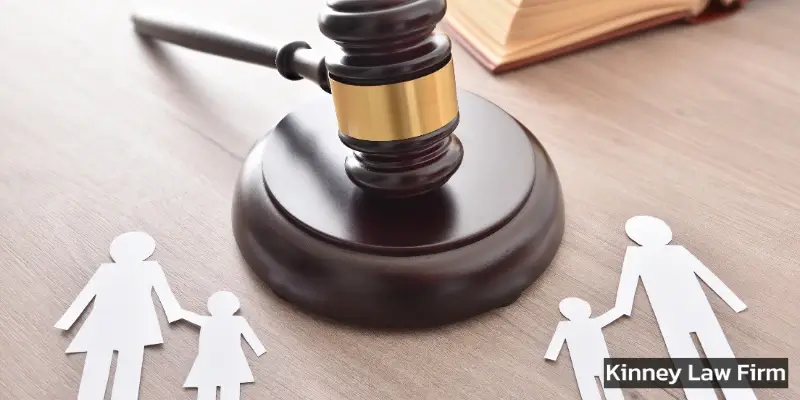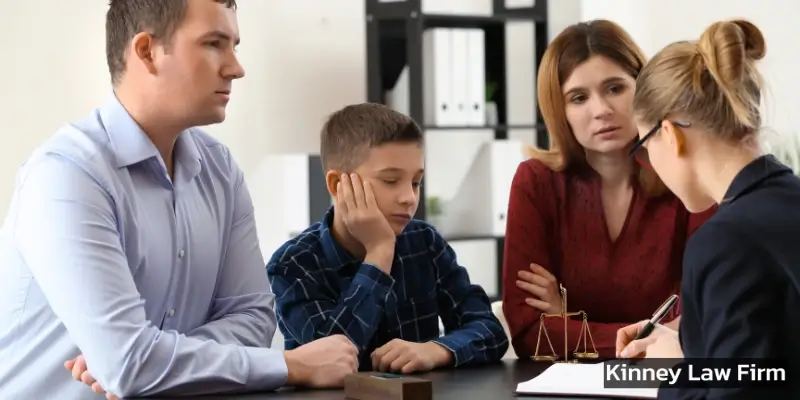Manning Child Custody Lawyer
Manning Child Custody Attorney
Child custody disputes can be some of the most emotionally challenging and legally complicated for families to manage. Whether you are navigating a divorce or seeking to modify an existing child custody order, it’s important to take the time to understand your rights and responsibilities as a parent. To assist in this effort, a Manning child custody lawyer can provide the guidance and advocacy you need to protect your child’s interests while balancing them with your own.
At Kinney Law Firm, we understand how overwhelming the child custody and visitation process can be. We know that you and your ex-spouse may have differing opinions on what is optimal for your children. When you need an experienced Manning family lawyer, we can help by providing clear legal guidance, negotiating on your behalf, and ensuring your voice is heard throughout the entire process, starting on day one.

Understanding the Child’s Needs in Custody Decisions in South Carolina
South Carolina focuses on promoting a child’s overall well-being when determining custody and visitation. This includes looking at each parent’s ability to provide a safe and supportive environment while maintaining a strong relationship with the child.
In FY24, there were more than 11,500 children in South Carolina who were involved in the Guardian ad Litem Program. This is a court-appointed advocacy program where trained volunteers or staff members represent the interests of children during custody and abuse-related proceedings. Guardian ad litem serves as the court’s eyes and ears to help judges better comprehend what a child’s living situation is and what their needs are. Some key factors that influence custody include:
- The child’s physical health, emotional needs, and developmental stage
- Each parent’s caregiving history and home stability
- The child’s connection to school, activities, and community
- Any evidence of abuse, neglect, or unsafe conditions
When Domestic Violence Impacts Custody
South Carolina law requires courts to consider all evidence, even if it seems extremely minor or seemingly circumstantial, when making custody decisions. Under Section 63-15-40, the court must weigh reports of physical or sexual abuse and try to figure out which parent, if any, was the primary aggressor.
These situations can significantly influence custody arrangements. Even when children are not the direct victims of violence, being exposed to conflict or an unsafe environment can affect their emotional and psychological development. In this effort, courts will review:
- Law enforcement and medical documentation
- Witness statements and protective orders
- Whether any form of supervised visitation is appropriate
- The overall pattern and severity of the incidents that were reported
Resolving Custody Through Mediation
For many families across South Carolina who are dealing with unresolved family legal troubles, mediation can provide a way to settle custody and visitation issues without needing to go through an adversarial court process. In South Carolina, the Department of Social Services offers mediation through the Child Support Services Division. This can help parents develop workable access and visitation plans through a more private and cooperative manner, if possible.
Mediation is especially useful when communication may be strained, but both parents are committed to supporting what their child needs and finding a solution. Many parents find the mediation process valuable as it:
- Reduces stress and conflict between parents
- Often leads to faster and more affordable outcomes
- Can sometimes produce more customizable visitation schedules
- Sets the tone for future cooperation
In addition, mediation gives parents more control over the outcome, rather than leaving such personal decisions solely in the hands of a judge. While mediation might not be the right call for every family, especially in cases where there has been a history of abuse or power imbalances, for many, it can be a constructive option for those looking for a more collaborative path forward.

FAQs
How Much Does a Child Custody Lawyer Cost in South Carolina?
The cost to hire a child custody lawyer in South Carolina will vary depending on how complicated the case is, the lawyer’s experience, and how much time is spent in court. Some cases may be resolved quickly through mediation, while others will need more extensive litigation to close outstanding issues. Many attorneys are known to charge by the hour, while others may offer a flat fee for specific services. Confirm an attorney fits your budget before hiring them.
What Should You Not Say During a Custody Battle?
While you are in the midst of a custody dispute, it’s important to avoid any statements that could reflect poorly on your character or parenting ability. For example, speaking negatively about the other parent in front of your child or in court could be damaging. You also want to avoid making any threats, exaggerating claims, or presenting yourself as unwilling to cooperate. Families in Manning, South Carolina facing custody battles often find that being careful with words can make the process smoother and less stressful.
What Is the Most Common Custody Arrangement in South Carolina?
While every custody case is unique, many families will end up with shared or joint custody arrangements. These allow both parents the ability to remain active in their child’s life. These setups are often designed to provide continuity and stability for a child while also recognizing the important role each parent plays in their upbringing. The specifics behind each parent’s schedule and how the responsibilities are divided up will also vary on a case-by-case basis.
Can a Child Choose Which Parent to Live With?
While a child’s preference can be considered, it’s only one factor among many that the court will look at when making a final decision. Courts can evaluate whether the child’s choice seems reasonable and if they are mature enough to form a reasonable opinion. However, the final decision will be based on more than just that. Other factors are also weighed heavily, such as each parent’s ability to provide a safe and stable home for the child to thrive.
Contact Kinney Law Firm Today
If you need a child custody or visitation lawyer, contact our firm today. We understand all of the common obstacles that might be overwhelming you and can put an action plan in place to help you better achieve the outcome you’re looking for.


